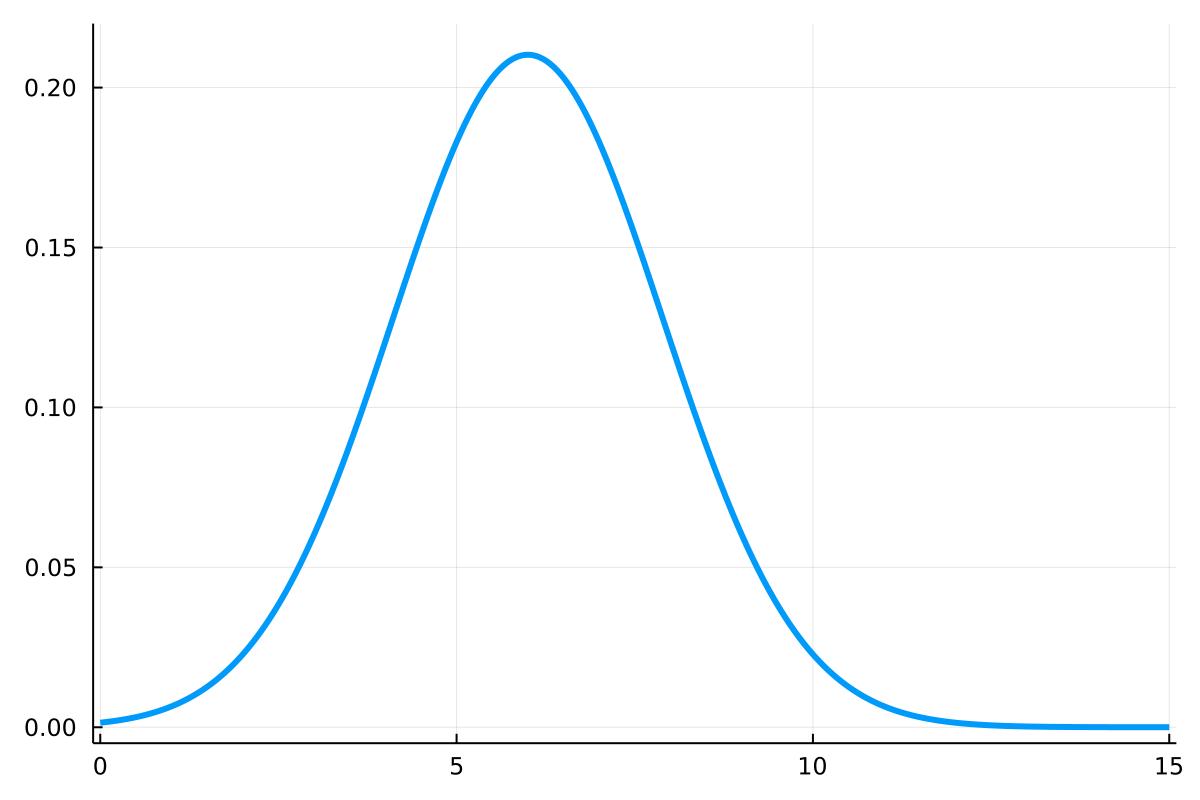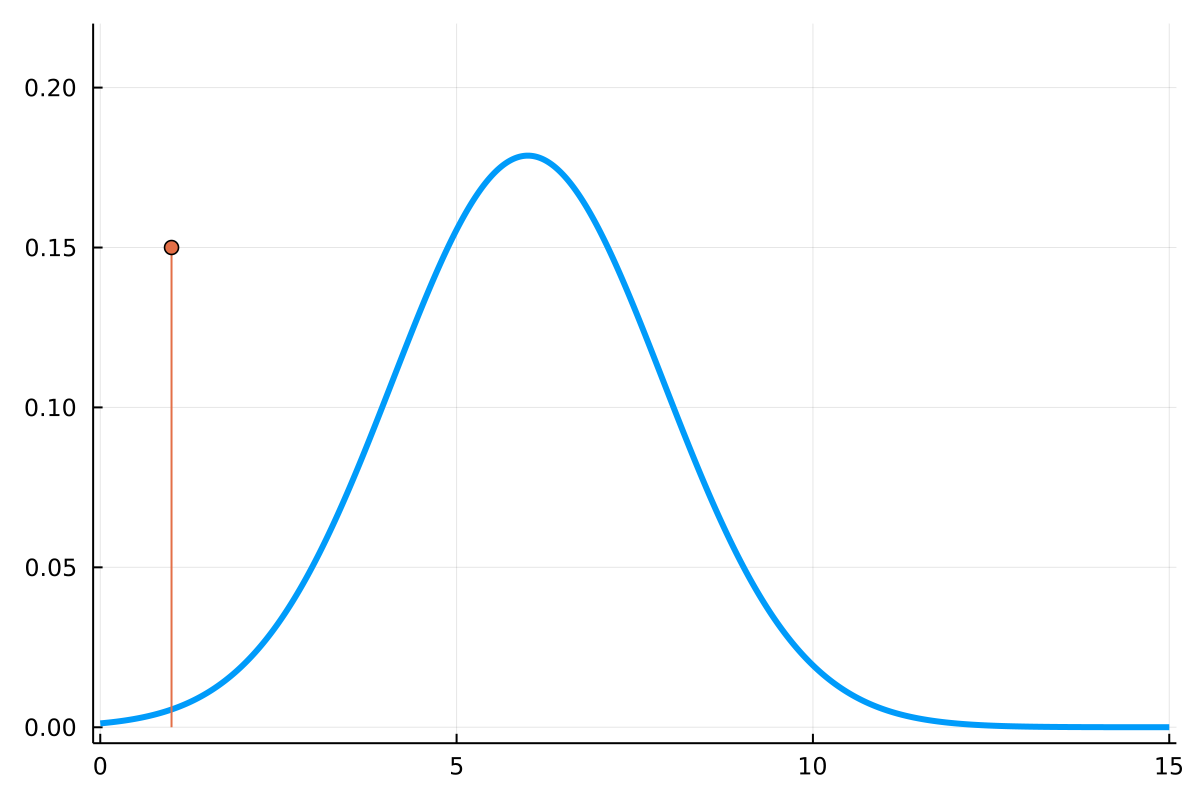Applied Measure Theory
for Probabilistic Modeling
Chad Scherrer
July 2023
Motivation: Discrete vs Continuous Distributions


Discrete Distributions
- Expressed as a probability mass function
- Evaluation gives a probability
- Values sum to one
Continuous Distributions
- Expressed as a probability density function
- Evaluation gives a probability density
- Values integrate to one
Motivation: Discrete vs Continuous Distributions

Discrete/Continuous Mixtures
- What is ?
- How is it interpreted?
- What is "integration"?
- How do we compute this?
discrete_part = Dirac(1)
continuous_part = Normal(15 * 0.4, sqrt(15 * 0.4 * 0.6))
m = 0.15 * discrete_part + 0.85 * continuous_partIn MeasureTheory.jl:
Importance Sampling
Rejection Sampling
Metropolis Hastings Sampling
KL Divergence
What's really going on?
Densities are always relative!
The MeasureTheory.jl Approach
Densities are always relative
- Old and very standard idea (Lebesgue, Radon, Nikodym)
- But no other software we know of makes this explicit!
function basemeasure(::Normal{()})
WeightedMeasure(static(-0.5 * log2π), LebesgueMeasure())
end
function logdensity_def(d::Normal{()}, x)
-x^2 / 2
endComputational advantages
- Easily represent more complex measures than usually possible
- Common structure can share computation
- Static computation makes this fast
- But no other software we know of makes this explicit!
Each measure has a base measure...
.. and a log-density relative to that base measure
Computing Log-Densities

What actually happens when you call logdensityof(Normal(5,2), 1)?
Affine((μ=5, σ=2), Normal())
Normal(5,2)
proxy
insupport(Affine(...), 1)
✓
0.5 * LebesgueMeasure()
basemeasure
LebesgueMeasure()
basemeasure
ℓ == -3.6121
basemeasure
0.3989 * Affine((μ=5, σ=2), LebesgueMeasure())
ℓ = 0.0
ℓ += -2.0
ℓ += -0.9189
ℓ += -0.6931
Can This be Fast?



Distributions.jl
MeasureTheory.jl

Computing Relative Log-Density

+
—
+
—
Parameterized Measures

Ways of writing Normal(0,2)
Normal(0,2)
Normal(μ=0, σ=2)
Normal(σ=2)
Normal(mean=0, std=2)
Normal(mu=0, sigma=2)Normal(μ=0, τ=0.25)Normal(μ=0, σ²=4)
Normal(mean=0, var=4)Normal(μ=0, logσ=0.69)Defining New Measures

A measure can be primitive or defined in terms of existing measures
Primitive Measures
TrivialMeasureLebesgueMeasureCountingMeasure
Product-like
-
ProductMeasure(⊗) -
PowerMeasure(^) For
Sum-like
-
SuperpositionMeasure(+) SpikeMixture-
IfElseMeasure(IfElse.ifelse)
Transformed Measures
-
PushforwardMeasure(pushfwd) -
Affine(affine)
Density-related
-
WeightedMeasure(*) -
PowerWeightedMeasure(↑) -
PointwiseProductMeasure(⊙) ParameterizedMeasure-
DensityMeasure(∫)
Support-related
-
RestrictedMeasure(restrict) -
HalfMeasure(Half) Dirac
IID Products


d = Beta(2,4) ^ (40,64)A PowerMeasure produces replicates a given measure over some shape.
⋆
⋆Independent and Identically Distributed
Products with Index Dependence


d = For(40,64) do i,j
Beta(i,j)
endFor(indices) do j
# maybe more computations
# ...
some_measure(j)
endFor produces independent samples with varying parameters.
Markov Chains


mc = Chain(Normal(μ=0.0)) do x Normal(μ=x) end
r = rand(mc)Define a new chain, take a sample
julia> take(r,100) == take(r,100)
trueThis returns a deterministic iterator
julia> logdensityof(mc, take(r, 1000))
-517.0515965372Evaluate on any finite subsequence
Working with Likelihoods

prior = HalfNormal()

Working with Likelihoods

prior = HalfNormal()
d = Normal(σ=2.0) ^ 10
lik = likelihood(d, x)

Working with Likelihoods

prior = HalfNormal()
d = Normal(σ=2.0) ^ 10
lik = likelihood(d, x)
post = prior ⊙ lik
Symbolic Evaluations

julia> using MeasureTheory, Symbolics
julia> @variables μ τ
2-element Vector{Num}:
μ
τ
julia> d = Normal(μ=μ, τ=τ) ^ 1000;
julia> x = randn(1000);
julia> ℓ = logdensityof(d, x) |> expand
500.0log(τ) + 3.81μ*τ - (503.81τ) - (500.0τ*(μ^2))- Types and functions are generic, so symbolic manipulations work out of the box
- Compare
- MeasureTheory.jl
- Distributions.jl
julia> logdensityof(Distributions.Normal(μ, 1 / √τ), 2.0)
ERROR: MethodError: no method matching logdensityof(::Num, ::Float64)Packages Using MeasureTheory.jl

- bat/BAT.jl: A Bayesian Analysis Toolkit in Julia (v3 will use MeasureBase.jl)
-
cscherrer/DistributionMeasures.jl: Conversions between Distributions.jl distributions and MeasureTheory.jl measures.
-
cscherrer/Soss.jl: Probabilistic programming via source rewriting
-
cscherrer/Tilde.jl: WIP successor to Soss.jl
-
jeremiahpslewis/IteratedProcessSimulations.jl: Simulate Machine Learning-based Business Processes in Julia
-
JuliaGaussianProcesses/AugmentedGPLikelihoods.jl: Provide all functions needed to work with augmented likelihoods (conditionally conjugate with Gaussians)
- mschauer/Mitosis.jl: Automatic probabilistic programming for scientific machine learning and dynamical models
-
mschauer/MitosisStochasticDiffEq.jl: Backward-filtering forward-guiding with StochasticDiffEq.jl
-
oschulz/ValueShapes.jl: Duality of view between named variables and flat vectors in Julia
-
ptiede/Comrade.jl: Composable Modeling of Radio Emission
-
ptiede/HyperCubeTransform.jl: We love to use nested sampling with the EHT, but it is rather annoying to
constantly write the prior transformation. This package will do that for you.
Thank You!
2023-06-MeasureTheory-Munich
By Chad Scherrer
2023-06-MeasureTheory-Munich
- 570



